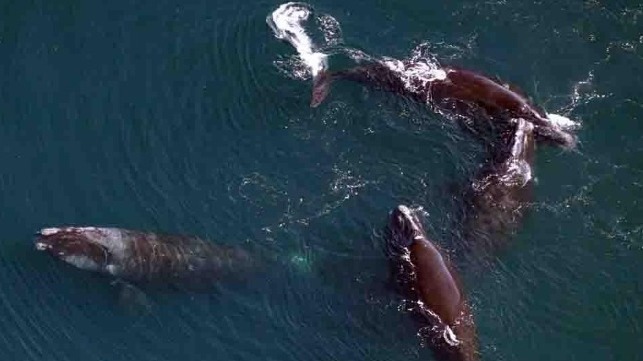Two Studies Show a Path to Save Endangered N. Atlantic Right Whale

In a pair of separate studies released Wednesday, researchers at Woods Hole, the National Oceanic and Atmospheric Association (NOAA) and the New England Aquarium published two portraits of a species in decline. The North Atlantic right whale is critically endangered, with an estimated 360 individuals still alive in the wild, and it is acutely vulnerable to ship strikes and entanglement in lobster pot lines; the studies come as NOAA is preparing to finalize new fishing gear rules that are intended to reduce whale mortality.
In the first study, the New England Aquarium examined available data on whale encounters, injuries, necropsies and overall health, along with the mortality database maintained by the National Marine Fisheries Service. They concluded that records only cover about a third of all estimated death between 1990 and 2017. The evidence suggests that many of the whales that are mortally wounded by human causes - lobster gear and ship strikes - survive long enough to disappear and are never tallied.
"Our work has shown that 83 percent of identified right whales have been entangled one or more times in fishing gear, and an increasing number of these events result in severe injuries or complex entanglements that the whales initially survive. But we know their health becomes compromised and they eventually succumb and sink upon death," said Amy Knowlton, senior scientist at the New England Aquarium's Anderson Cabot Center for Ocean Life. "These serious entanglements are preventable with regulatory changes and a commitment from the fishing industry and the U.S. and Canadian governments to do more to address this threat."
In the second, the Woods Hole Oceanographic Institute and NOAA released "the first broad scale synthesis of available information derived from right whale health assessment techniques." The survey, published Wednesday in the journal Diseases of Aquatic Organisms, reviews current understanding of individual whales and the species as a whole.
Of particular note for the lobster industry, their findings suggest that when whales get wrapped in lobster pot line, the extra drag reduces their viability and ability to reproduce - even when they do not die. The finding suggests that switching to reduced-breaking-strength buoy line may not be good enough, and that "ultimately, removal of rope from the water column will better enable species recovery."
Removing the rope from the water column would require the adoption of "ropeless gear," which the lobster industry generally views as an expensive and burdensome alternative. Acoustically-actuated buoy release devices - which keep the rope and buoy on the bottom until they are needed - have been in common use in oceanography for years, but would be a new and high-capex solution for lobstermen.
"North Atlantic right whales face a serious risk of extinction, but there is hope if we can work together on solutions. Trauma reduction measures and applying new tools to assess their health are critically important to enhance the welfare of individual whales. If we can reduce the number of deaths, and successfully improve their health to increase reproduction, the current decline in population can be reversed," said lead author Michael Moore, a whale trauma researcher at Woods Hole.
The studies come as the National Marine Fisheries Service prepares new requirements for the New England lobster fishery, aiming to reduce whale mortality by managing the risk of entanglement. The agency has to finalize the rules by May 31 and is accepting public comments through March 1.
The proposed rules would require adding weak links into buoy lines, which would improve a whale's odds of breaking away; require more pots per buoy line; modifying seasonal restricted areas to be closed to buoy lines; and add up to two new seasonal buoy line closures.
The proposal - which was drawn up and announced towards the end of the previous administration - has drawn criticism from both environmentalists and fishermen. Speaking on behalf of Maine's lobstermen and their suppliers, Maine's congressional delegation has called on President Joe Biden to soften the proposed changes because of the "impact these proposed conservation measures will have on our lobstermen, fishermen, and the entire seafood industry in the state of Maine."
Meanwhile, environmental advocacy organizations like Oceana contend that the proposed rules are too weak. In a statement, Oceana called on NOAA to add more buoy line closures, with a plan for a transition to ropeless gear and a mandatory AIS carriage requirement for lobster boats. "With North Atlantic right whale numbers declining, they can’t afford any more delays. Oceana calls on NOAA to finalize strong protections for these whales before it is too late," said Oceana campaign director Whitney Webber.
